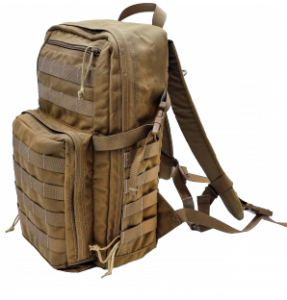
When it comes to choosing a backpack, many factors come into play – style, durability, and how much weight can a backpack hold, to name a few. But one aspect that often gets overlooked is the weight capacity of a backpack. How heavy is too heavy for a backpack? What is the ideal backpack weight for different purposes? These are questions that are essential to understand in order to prevent strain, discomfort, or even injury. Whether you’re planning a hiking trip or selecting a backpack for everyday use, understanding the limitations of backpack weight capacity is crucial.
In this article, we will delve into this topic and provide you with insights on how to determine an ideal backpack weight, including a reference to the US Army soldier equipment list as an example. So, let’s explore the world of backpack weight capacity and ensure you never have to bear more weight than necessary.
How to Determine the Weight Capacity of Your Backpack
When it comes to choosing the right backpack for your equipment, one crucial factor to consider is the weight capacity. A key aspect that demands attention is the backpack’s weight capacity. It’s essential to grasp how much weight you can comfortably and safely carry. Whether you’re a hiker, a traveler, or a soldier, knowing the weight limit of your rucksack is essential.
The weight of a backpack can vary depending on its size, design, and intended use. For hikers and travelers, a comfortable weight range is typically around 20-30% of your body weight. Carrying too heavy a load can lead to fatigue, back pain, and even long-term injuries. Soldiers, on the other hand, often face a much higher weight burden due to the nature of their duties, carrying loads upwards of 50% of their body weight.
To determine the weight capacity of your backpack, it’s crucial to determine the weight of the equipment you carry in it. This provides guidelines for the bag’s construction and materials. Additionally, consider features such as reinforced straps, padded back support, and waist belts, as these contribute to distributing the weight evenly across your body.
When figuring out how much weight you can carry in a backpack without overburdening yourself, it’s crucial to take into account your own physical capabilities, including strength and endurance, as well as how long you’ll be on the move. Aiming to keep your pack as light as possible while still packing the essentials goes a long way in ensuring you stay comfortable and functional throughout your journey. By understanding your backpack’s weight capacity, you can transport on your equipment with peace of mind, knowing you won’t be weighed down by an excessive load.

Calculating the Maximum Load for Safe and Comfortable Carrying
When it comes to carrying heavy loads, whether as a soldier in the military or as an outdoor enthusiast, it is crucial to determine the maximum weight that you can safely and comfortably carry. Overburdening yourself can lead to serious injuries or discomfort, hindering your performance and overall experience. So, how much weight do soldiers carry? And how much do backpacks weigh?
Soldiers often have to carry a significant amount of weight during operations. A common standard for maximum load is around 1/3rd of a person’s body weight.
For example, if a soldier weighs 180 pounds, they may be expected to carry up to 60 pounds of gear. This includes weapons, ammunition, body armor, communication devices, and other essential supplies. Factors such as the length of the mission and the terrain may also affect the weight soldiers carry.
As for backpacks, the weight they add to your load can vary depending on the type and purpose of the backpack. A lightweight nylon bag may weigh anywhere from less than a pound to a few pounds, while larger backpacks designed for multi-day trips or expeditions can exceed 5 pounds. Additionally, the weight of the items you pack inside your backpack should also be taken into consideration.
Calculating the maximum load for safe and comfortable carrying is not a one-size-fits-all process. It is crucial to consider your own physical capabilities, the distance you’ll be traveling, and the terrain you’ll encounter. Seeking guidance from professionals or experienced individuals can be beneficial in determining the right weight to carry. Ultimately, finding the balance between safety, comfort, and functionality is key to enjoying your outdoor adventures or fulfilling your obligations as a soldier.
Factors that Affect a Backpack’s Weight Capacity
When it comes to choosing a backpack, one of the crucial factors to consider is its weight capacity. How much weight a backpack can carry is essential for those who use it for hiking, traveling, or even everyday use. But what actually determines a backpack’s weight capacity?
Firstly, the weight of the backpack itself needs to be taken into account. Backpacks come in a variety of materials such as nylon, polyester, and canvas, each with its own weight. A lightweight backpack will allow for more weight to be carried inside, while a heavy backpack may have a lower weight capacity due to the materials used.
Secondly, the design and construction of the backpack play a significant role in its weight capacity. A backpack with reinforced stitching, sturdy zippers, and durable straps will have a higher weight capacity as it can handle heavier loads without breaking or tearing. Additionally, backpacks with an internal frame or aluminum stays provide better support and weight distribution, allowing for higher weight capacity.
Lastly, the wearer’s comfort and safety are also important factors that affect a backpack’s weight capacity. How much weight can a person carry in a backpack depends on their physical strength and endurance. Carrying too much weight can lead to strain, fatigue, and even injuries. It is generally recommended that a person shouldn’t carry more than 20-25% of their body weight in a backpack to avoid discomfort and potential health issues.
In conclusion, several factors determine a backpack’s weight capacity. These include the weight of the backpack itself, its design and construction, and the wearer’s physical abilities. When choosing a backpack, it’s important to consider these factors to ensure that it can comfortably accommodate the weight you need to carry while providing support and durability. So, next time you’re shopping for a backpack, keep in mind how much weight it can handle to make sure it meets your needs and keeps you comfortable on your adventures.
